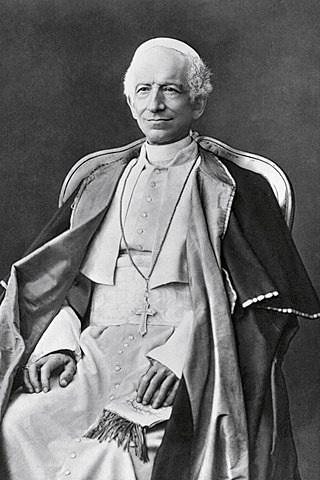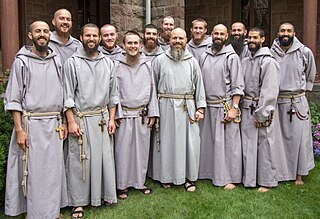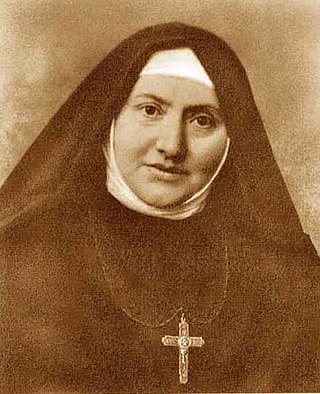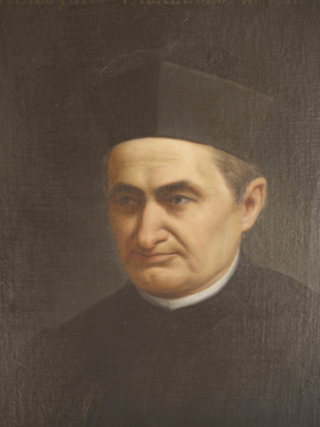Related Research Articles

The Franciscans are a group of related mendicant religious orders of the Catholic Church. Founded in 1209 by the Italian saint Francis of Assisi, these orders include three independent orders for men, orders for nuns such as the Order of Saint Clare, and the Third Order of Saint Francis open to male and female members. They adhere to the teachings and spiritual disciplines of the founder and of his main associates and followers, such as Clare of Assisi, Anthony of Padua, and Elizabeth of Hungary. Several smaller Protestant Franciscan orders or other groups have been established since late 1800s as well, particularly in the Anglican and Lutheran traditions.

The Pontifical Gregorian University, is a higher education ecclesiastical school located in Rome, Italy.

The Barnabites, officially named as the Clerics Regular of Saint Paul, are a religious order of clerics regular founded in 1530 in the Catholic Church. They are associated with the Angelic Sisters of Saint Paul and the members of the Barnabite lay movement.

The papal conclave held from 18 to 20 February 1878 saw the election of Vincenzo Pecci, who took the name Leo XIII as pope. Held after the death of Pius IX, who had had the longest pontificate since Saint Peter, it was the first election of a pope who would not rule the Papal States. It was the first to meet in the Apostolic Palace in the Vatican because the venue used earlier in the 19th century, the Quirinal Palace, was now the palace of the king of Italy, Umberto I.
Giustino Russolillo, SDV - in religious Giustino Maria della SS. Trinità - was an Italian Catholic priest and the founder of the Vocationist Fathers, the Vocationist Sisters and of the Secular Institute of the Apostles of Universal Sanctification.

The Franciscan Friars of the Renewal is a Catholic clerical religious congregation of Pontifical Right for men founded in 1987. It follows the Capuchin Franciscan tradition.
The Third Order of Saint Francis is a third order in the Franciscan tradition of Christianity, founded by the medieval Italian Catholic friar Francis of Assisi.

Magdalena di Canossa was an Italian religious sister and the foundress of the two Canossian congregations. Magdalena was a leading advocate for the poor in her region after she witnessed first hand the plight of the poor following the spillover effects of the French Revolution into the Italian peninsula through the Napoleonic invasion of the northern territories. Canossa collaborated with humanitarians such as Leopoldina Naudet and Antonio Rosmini in her mission of promoting the needs of the poor and setting a new method of religious life for both men and women.

Ludovico da Casoria - born Arcangelo Palmentieri - was an Italian Roman Catholic priest and a professed member of the Order of Friars Minor. He was a renowned social reformer who founded both the Grey Friars of Charity and the Grey Sisters of Saint Elizabeth.

The Franciscan Friars of the Immaculate is a religious institute founded in 1970 by Conventual Franciscans Stefano Maria Manelli and Gabriel Maria Pellettieri and canonically erected by Pope John Paul II in 1998. Their rule of life is the Regula Bullata of Saint Francis of Assisi according to the Traccia Mariana.

Geltrude Caterina Comensoli, also known as Mother Geltrude is the Patron of Youth, Val Camonica and Relic Custodians.

Women play significant roles in the life of the Catholic Church, although excluded from the Catholic hierarchy of bishops, priests, and deacons. In the history of the Catholic Church, the church often influenced social attitudes toward women. Influential Catholic women have included theologians, abbesses, monarchs, missionaries, mystics, martyrs, scientists, nurses, hospital administrators, educationalists, religious sisters, Doctors of the Church, and canonised saints. Women constitute the majority of members of consecrated life in the Catholic Church: in 2010, there were around 721,935 professed women religious. Motherhood and family are given an exalted status in Catholicism, with The Blessed Virgin Mary holding a special place of veneration.

Teresa Grillo Michel, born as Teresa Grillo and also known by her religious name Maria Antonia, was an Italian Roman Catholic nun and the founder of the Little Sisters of Divine Providence. Grillo was a widow who also part of the Third Order of Saint Francis; she entered the religious life following the death of her husband. Grillo studied in Turin and Lodi before returning to her hometown Alessandria where she married. But her husband died sometime later leaving her in a deep depression that came a call to help the poor. Grillo founded a religious congregation that would expand into Latin America and she would also maintain contact with important individuals such as Luigi Orione and Clelia Merloni both of whom she befriended.

Maria Domenica Mantovani was an Italian Roman Catholic professed religious, and the co-founder of the Little Sisters of the Holy Family; she established them alongside Giuseppe Nascimbeni. As a nun she received the religious name of Maria of the Immaculate.
Maria Giuseppa Rossello was an Italian religious sister who founded the Daughters of Our Lady of Mercy. She has been declared a saint by the Catholic Church.

Luigi Maria Palazzolo was an Italian Roman Catholic priest. He established the Sisters of the Poor which was also known as the Palazzolo Institute. Other contributions include the construction of an orphanage for children in Traona and also the Little House of Divine Providence. He also worked for the poor and the outcast until his death.
Francesco Spinelli was an Italian Roman Catholic priest and the founder of the Sisters Adorers of the Blessed Sacrament. Spinelli became close contemporaries of Geltrude Comensoli and Luigi Maria Palazzolo and had a previous collaboration with Comensoli in which the two established a religious institute in Bergamo before a rift between members caused Spinelli to distance himself from its work and leave.

The Comboni Missionaries of the Heart of Jesus, also known as the Comboni Missionaries of the Sacred Heart, or the Verona Fathers, and originally called the Sons of the Sacred Heart of Jesus, is a Catholic clerical male religious congregation of pontifical right.
Giuseppe Cognata was an Italian Catholic bishop and member of the Salesians of Don Bosco. He was the founder of the Salesian Oblates of the Sacred Heart of Jesus, a female religious institute of pontifical right. Due to accusations that were proved false many years after, the Congregation for the Doctrine of the Faith condemned Mgr. Cognata to be dismissed of his condition of Bishop on 20 December 1939. Monsignor Giuseppe Cognata in Easter 1962 was reinstated by Pope John XXIII in the Episcopate, after the true came out. The Congregation for the Doctrine of the Faith announced on 17 February 2020 that Pope Francis has given consent to open the Cause of Beatification of Mons. Giuseppe Cognata, S.D.B.
References
- 1 2 "Blessed Luigi Maria Palazzolo: Friend of the poor and abandoned | Salt + Light Media". slmedia.org. Retrieved 2023-10-16.
- ↑ "Pope Francis advances causes of nuns who died in Ebola outbreak – Catholic Recruitment". catholicrecruitment.co.uk. Retrieved 2023-10-16.
- ↑ "Sainthood causes of three more religious sisters who died in Ebola outbreak advance". www.catholicworldreport.com. Retrieved 2023-10-16.
- ↑ ""Martyrs of Charity"". www.newsaints.faithweb.com. Retrieved 2023-10-16.